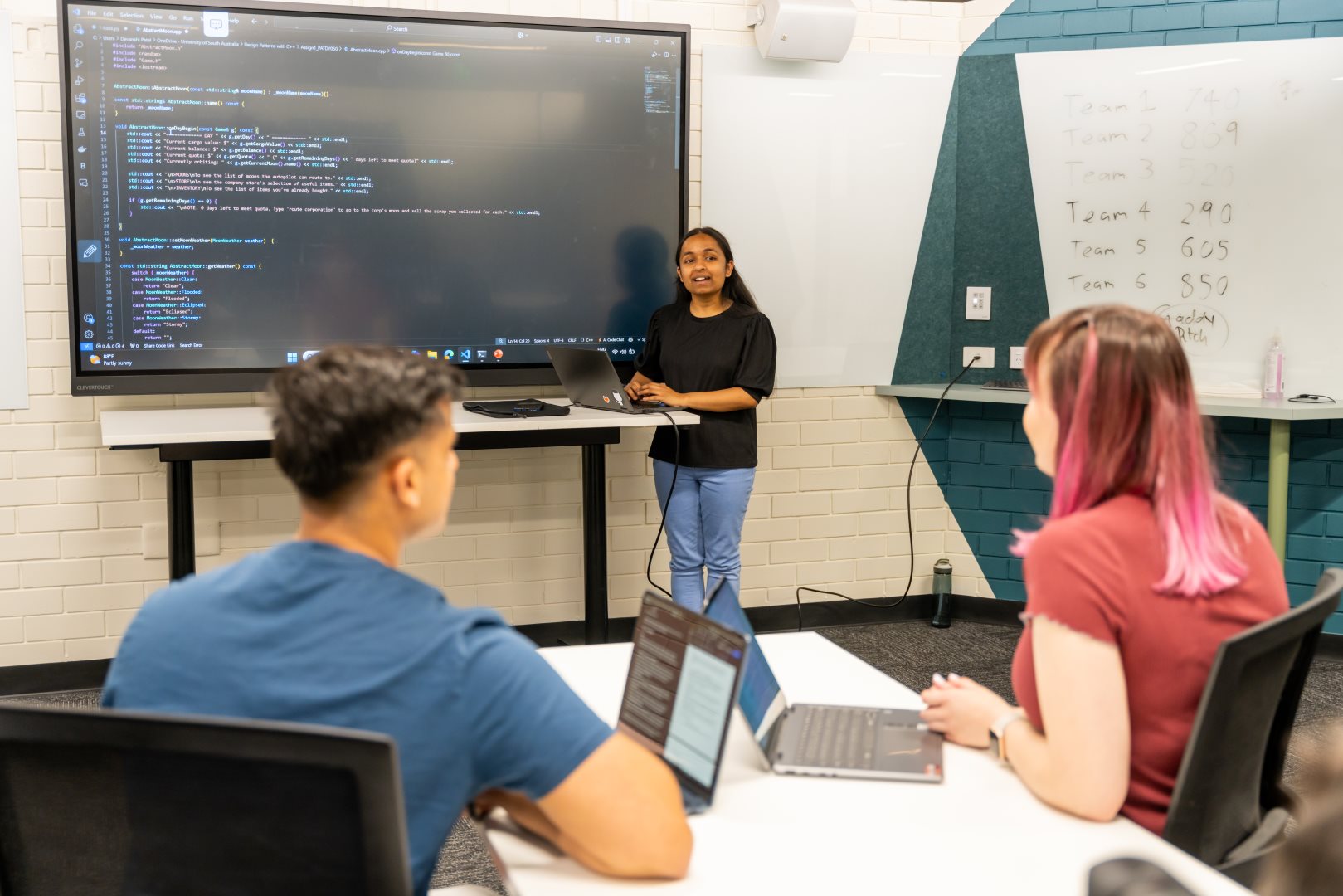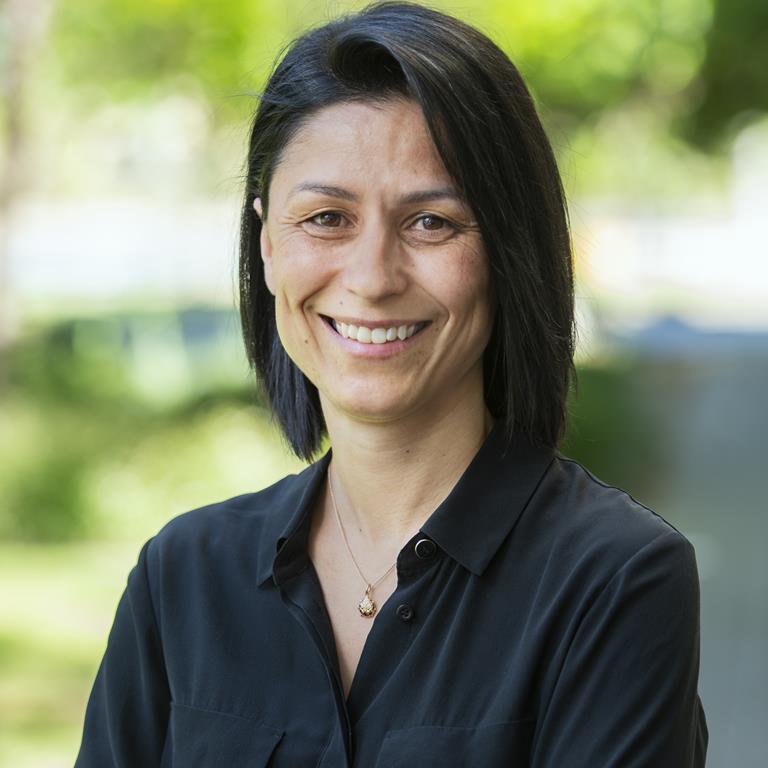Bachelor of Information Technology (Software Development)
Degree Level Undergraduate
Year 2025
You're considered an International student if you are:
Degree Level Undergraduate
Year 2025
Program Code
LBCP
Prerequisites
None
Assumed Knowledge
None
Fees
AUD$ 39,400 per annum (per 1.0 EFTSL) for students enrolled in 2025
Admissions
Student Profile
International Admission by Country
See full entry requirements
CRICOS Code
067897M
The admission criteria have been grouped to assist you to easily find the information most relevant to your circumstances. However, you may fit into more than one and the university will consider applicants against each of the relevant criteria.
Certain conditions apply. For more information refer to Appendix 4 of the University's Selection and Entry policy.
Applicants are required to meet one of the following criteria with a competitive result, and demonstrate that they fulfil any prerequisite requirements and essential requirements for admission:
Recent secondary education
Meet any prerequisite requirements with a minimum grade of C- or equivalent
AND
Applicants who have not achieved the Selection Rank required for automatic selection may be selected for any remaining places based on the grades of their year 12 subjects.
OR
Higher education study
OR
Vocational Education and Training (VET)
OR
Work and life experience
| Canada High School (OSSD) | 65 |
| Eynesbury FSP | 320 |
| German Abitur | 3.5 |
| Kenya KCSE (average) | B |
| Malaysia STPM (best 3) | 6 |
| Malaysia UEC | 31 |
| Norway GPA | 3 |
| Pakistan HSSC | 80 |
| Sri Lanka A Levels (best 3) | 7 |
| Sweden GPA | 13 |
| UK Board GCE A Levels/HK Board | 7 |
| Vietnam | 7.5 |
| Australia | 66 |
| IB (best 6) | 26 |
| USA SAT (1600) | 1110 |
| India (best 4) State Board | 75 |
| India (best 4) Central Board | 65 |
| HKDSE | 15 |
| Nepal NEB | 2.51 |
| Bangladesh HSC | 3.5 |
1ComparED (QILT) Student Experience Survey 2021-22, Computing and Information Systems – Skills Development Indicator (Undergraduate). SA public universities.
3Deloitte Access Economics, ACS Australia’s Digital Pulse 2021

It is predicted that by 2026 there will be nearly 300,000 more technology workers in the Australian workforce. The largest increase in employment is expected for software and applications programmers, with 65,200 workers expected to join the profession between 2020 and 2026¹.
The Bachelor of Information Technology (Software Development) will see you develop specialist expertise in the creation of computer software and applications, preparing you for a rewarding career in this high demand area of ICT. Proficient in programming and equipped to work in a diverse range of programming roles, graduates may find work in IT companies, freelance consulting and IT departments across the public and private sector.
You will learn to write code in several programming languages – Java, C++, Python, SQL, ASP.Net – and develop the skills needed to design, implement, evaluate and test new and existing software programs. You will also learn critical and industry relevant software development methodologies including Agile and SCRUM.
Professionally accredited by the Australian Computer Society, you will enjoy a modern, practical approach to your IT education, with significant opportunities to apply the knowledge and skills learned in the classroom in real-world settings so that you graduate ready to meet the needs of industry.
Enjoy a common first-year across most IT degrees enabling you to switch between specialisations and receive credit for completed courses. This means if you change your mind about your IT specialisation after first-year, you can change programs and still complete your degree in 3 or 4 years full-time (depending on your degree length). Start now, decide later.
On-campus teaching for this program is based at the Mawson Lakes campus. Only 20 minutes from the city centre with easy parking. The Mawson Lakes campus is also accessible by bus and train with the Mawson Lakes train station only a short walk.
1Deloitte Economics, Australia Digital Pulse 2021

During your first year of study you will gain a solid foundation in networking, database development, programming fundamentals and systems requirements and design, before focusing on your software development specialty that will you see you studying:
In your final year, you will put your skills into practice through our ICT Capstone Project. You may have the opportunity to work directly with an industry client, drawing on the technical expertise gained throughout your studies and applying professional skills – communication strategy, stakeholder relationship management, project management – in a real-world setting to produce and deliver an artefact for your client. This could include the application of new technologies, developing proof of concept solutions and analysing current business processes to identify areas for improvement.
You will enjoy access to dedicated learning hubs where you can connect and collaborate, giving you the full workplace and project experience.
1Deloitte Access Economics, ACS Australia’s Digital Pulse 2021

The Bachelor of Information Technology (Software Development) will see you graduate as an ICT professional with the expertise to pursue a career in the specialist area of computer software and applications development.
Throughout your program you will complete a unique series of collaborative, work-integrated courses, reinforcing the concepts learnt in the classroom in a supportive practice environment. Soft, non-technical skills are also integrated into your learning to develop the qualities highly valued and sought after by industry. Topics include design thinking, system requirements, system design, agile development, and project management.
In your final year you may have the opportunity to work directly with an industry client – from brief through to project delivery – with our ICT Capstone Project. This allows you to demonstrate your ability to deliver work to industry standard, and to the satisfaction of a client.
Most of our IT undergraduate programs share a common first-year, so choosing this degree offers ultimate flexibility. Should you wish to pursue a different specialty after completing your first-year, you can switch to an alternative IT program and receive credit for the courses completed. Start now, decide later.
Explore our purpose-built IT facilities at the UniSA Mawson Lakes campus.

The number of technology workers in Australia is expected to pass 1 million in 2024. By 2026, it is predicted there will be nearly 300,000 more technology workers in the Australian workforce – an average annual growth rate of 5.4%. And software programming skills are in particularly high demand¹.
There are strong employment prospects for suitably qualified ICT professionals.
Graduates of this degree may wish to consider the following career options:
Career progression may see you take on roles such as:
1Deloitte Access Economics, ACS Australia’s Digital Pulse 2021
This program is professionally accredited by the Australian Computer Society.
How to apply for international students will give you helpful information about the application process at the University of South Australia. When you are ready, apply through our International Application System. If you would like to talk to someone near you about studying at the University of South Australia, we have agents all over the world who can assist you. Find an Education Agent in your country.
Australian
There are other pathways you can follow to study this degree, including:
International
There are other pathways you can follow to study this degree, including:
Every year, over 2,500 UniSA students are supported in their studies through scholarships and grants worth millions of dollars. Check out the scholarships below. One of them may be perfect for you. Visit our scholarships page for more.
Recipients can get a 50% reduction on tuition fees for up to four years of full-time study for selected degrees.
Recipients can get a 15% reduction on tuition fees for the duration of their chosen degree.
As a UniSA student, you will have unique access to work placement opportunities, overseas study tours and exchanges, networking events, internships, guest speakers and more.
Our campuses are equipped with state-of-the-art facilities including modern lecture theatres, libraries, workshops and laboratories, as well as spaces that simulate real work environments. These are all supported by the latest technologies and a 24/7 online learning platform. We have health services on campus, gymnasiums, technology zones and great student lounges. You will also gain access to a range of community clinics, which provide professional and cost effective services in areas of health, business, law and psychology. There are campus sport activities to keep you active, and if you are keen to explore the social side of university life, there are movies, cooking demonstrations, parties and lots more.
Adelaide also has a variety of accommodation options to suit different requirements and budgets. Options include dedicated student accommodation and private rentals. See our long-term accommodation pages, or explore our student accommodation by Scape on Bank Street in Adelaide’s lively cultural precinct, an ideal location for students. It is within easy reach of UniSA’s city and metropolitan campuses, Rundle Mall shopping, the Central Market, Chinatown, and the West End’s vibrant nightlife. It is also across the road from the Adelaide train station, and on bus and tram routes.
UniSA is ranked Number 1 in SA for campus facilities in IT¹.
During your studies you will have access to purpose-built learning spaces such as:
1ComparED (QILT) Student Experience Survey 2019-20 – Computing and Information Systems – Learning Resources Indicator (Undergraduate). SA public universities.


There are a number of ways to apply to study UniSA's undergraduate and postgraduate coursework degrees.
You can access our online International Application System through our How to Apply page. The International Application System is an easy and secure online application and acceptance process. You will have visibility of your application through the secure online portal with the ability to download offer documents, submit your acceptance and make a payment.
Alternatively you can submit an application through one of the University's registered Education Agents.
If you are completing an Australian year 12 qualification in Australia or overseas, or the International Baccalaureate (IB) Diploma Programme in Australia, you must apply through SATAC http://www.satac.edu.au/.
If you are applying for the UniSA Study Abroad or Study Abroad Plus program, you can submit your application online here.
Postgraduate study by research
For information on applying to do postgraduate study by research, including Masters by Research, PhDs or Doctorates, please visit http://unisa.edu.au/resdegrees.
There is no closing date for submitting your application however the admissions process takes between one and three weeks from the date that we receive your application and all required supporting documentation.
If you are completing an Australian year 12 qualification in Australia or overseas, or the International Baccalaureate (IB) Diploma Programme in Australia, you must apply through SATAC. Key dates for applications can be found here.
You may be eligible to receive credit or advanced standing for your chosen UniSA degree based on your previous studies, if they are in a related area at an equivalent or higher level. Receiving credit will reduce the number of courses you undertake within the degree, and may also reduce the overall duration of your degree.
The amount of credit you may be eligible to receive is assessed on a case-by-case basis by the Admissions team.
The best way to determine your eligibility to receive credit or advanced standing is to apply using our International Application System which can be found on our How to Apply page. You will need to supply detailed syllabus documents with your application.
UniSA welcomes the opportunity to speak with you regarding your study options. Our staff are able to talk to you about degree information, career outcomes and pathways, entry requirements, applications, and student life, so that you are able to make the best study decision for your future.
Click here to book a 1:1 appointment with one of our enquiries team.
We also have many events throughout the year in Australia and overseas where you can speak with UniSA representatives about your area of interest. View our calendar of events in your home country by selecting the 'International' filter.